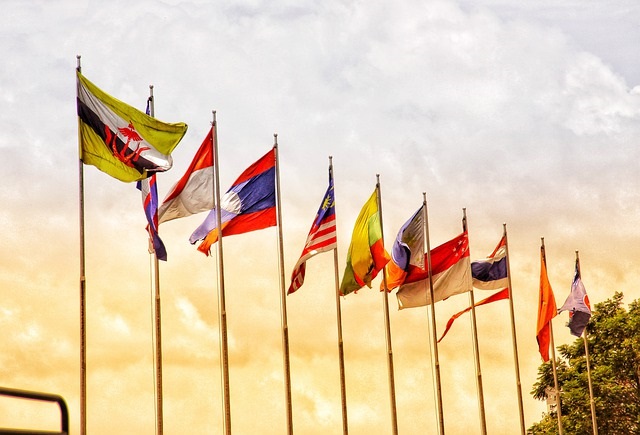'ASEAN' which stands for 'The Association of South-East Asian Nations', is a regional organisation of 10 South-East Asian Countries, established on August 8, 1967 under the ASEAN declaration, also known as the Bangkok declaration. Initially the declaration was signed by its 5 founding fathers; Indonesia, Malaysia, Thailand, Singapore and Philippines with a vision to promote and prosper its political and social stability among Asia- Pacific post colonial states.
With Brunei Darussalam on 7 January 1984, Vietnam on 28 July 1995, Laos (Lao PDR) & Myanmar on 23 July 1997 and Cambodia on 30 April 1999, ASEAN finally became an organisation of Ten South-East Asian member countries.

Motto of ASEAN
The ASEAN works with the motto of:
"One Vision, One Identity, One Community".
The Headquarter of ASEAN is situated in Jakarta, Indonesia.
Administrative Authority Of ASEAN
The Administrative powers are held by the Chairman and the Secretary General of ASEAN. The Chairman is appointed for a tenure of one year, which is rotatory on the basis of alphabetical order of English names of Member states. Currently Cambodian PM Mr. Hun Sen is the Chairman of ASEAN. In 2022, Cambodia is having the honor of serving as the ASEAN chair for the third time under the theme:
"ASEAN A.C.T. : Addressing Challenges Together"
Togetherness emphasises the action-oriented approach of ASEAN that is based on openness, good faith, solidarity and harmony within the ASEAN family.
The Secretary General is the Chief Administrative Officer, who is appointed for a period of 5 years among nationals of the member states. Since 2017 His Excellency Lim Jock Hoi from Brunei has been serving on this post.
The summit of ASEAN is held twice a year and the first summit was held in Bali, Indonesia on February 23-24, 1976.
ASEAN Charter
To adopt the principles of regional cooperation, democratic values, human rights and integrated development, a constituent document was adopted at the 13th ASEAN summit in November 2007, known as ASEAN Charter. It came into effect in December 2008. With the enactment of the Charter, ASEAN not only moved one step closer to an "EU-style community", but also it turned into a legal entity with an aim to create a single free-trade area for the region encompassing 600 million people.
The appointment of Secretary-general and permanent representatives of ASEAN, scheduling the summits twice a year were some major principles constituted in the Charter.
Global Significance of ASEAN
With over 600 million population ASEAN forms the 3rd largest market in the world, larger than EU and North American markets. It is the 4th largest economy in the world and 3rd largest in Asia. ASEAN as a single country has a combined GDP over 3 trillion US $ in 2022 which is estimated to cross 4 trillion US $ in 2026.
Its cultural diversity and critical geographic position, straddling the sea lanes between the Indian Ocean in the west and the Pacific Ocean in the east, are considered of utmost importance at geo-political level. With 7% of total global export, ASEAN is the 4th largest export region in the world.
India-ASEAN Relation
Starting from 1992, India shares its 3 decade long relationship with ASEAN countries. In 1991, by then-Prime Minister, LPG reforms were adopted to foster the social-economic condition of India. At the same time India adopted the Look East Policy (LEP) to grow its Economic and Strategic relations with South-East Asian countries.
In 1992 India became the sectoral partner of the ASEAN. After the success of LEP, in 1996, India became its full dialogue partner, moving ahead Summit level partner in 2002 and in 2012 this relationship upgraded into strategic partnership.
INDIA's Act East Policy
In 2014, at the 12th ASEAN-India summit, held in Myanmar, an action oriented, project and outcome based "Act East Policy" (AEP), was enunciated by the then-Prime Minister. To ensure the economic, social and Secretary cooperation among India and ASEAN countries the Act East Policy is based on 4Cs:
"Culture, Commerce, Connectivity, Capacity Building."
AEP emphasises India's strong economic cooperation, cultural ties and strategic relationships with countries in the Indo-Pacific region. Its main purpose is to provide connectivity to the states of north-eastern region including Arunachal Pradesh with our neighbouring countries through trade, culture, people to people contacts, infrastructures , telecommunication, power etc.
Kaladan Multimodal project to connect West Bengal with Mizoram via Bay of Bengal and Myanmar, and India-Myanmar-Thailand Trilateral highway project are parts of the strategic AEP of India.
India-ASEAN Summits
To foster the shared vision of global commerce, and to counter the aggressive behavior of China in the South China Sea and the growing influence of it in the Indian ocean, the 16th India-ASEAN summit was held at Bangkok in 2019. In which ASEAN- outlook on Indo-Pacific and India-Pacific oceans initiatives were thoroughly discussed. While the 17th summit held in 2020 was focused on speeding up Connectivity initiatives between India-ASEAN.
In the 18th summit of India-ASEAN, the 30th anniversary of India-ASEAN partnership was celebrated where 2022 was declared as India-ASEAN friendship year.
India-ASEAN: A Long Way To Go
In 2009, India signed the Free Trade Agreement (FTA) with ASEAN. As a result, in per capita terms India was exporting its 10% US $ to only ASEAN while it imports around 11.9% US $ from ASEAN in return.
ASEAN is the 5th largest trading partner for India having Vietnam as its biggest electronics hub. It is also the 3rd largest Engineering export market which accounts for 40% share in India's total export to ASEAN. India's bilateral trade with ASEAN economies is expected to reach $300 billion by 2025.
Though there is a long way to go, India-ASIAN plan of action 2021-2025 emphasises on effective implementation of service and trade agreements, strengthening value chain linkages through SCRI (Supply chain resilience initiatives) and transforming highways into economic corridors.



 Click it and Unblock the Notifications
Click it and Unblock the Notifications




























